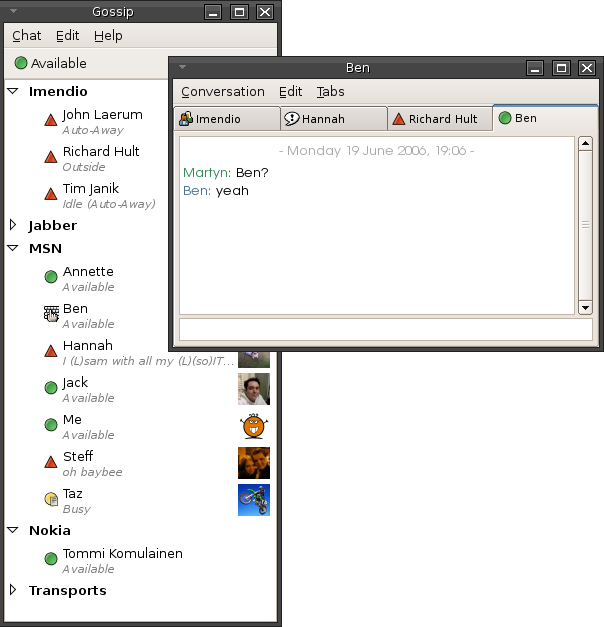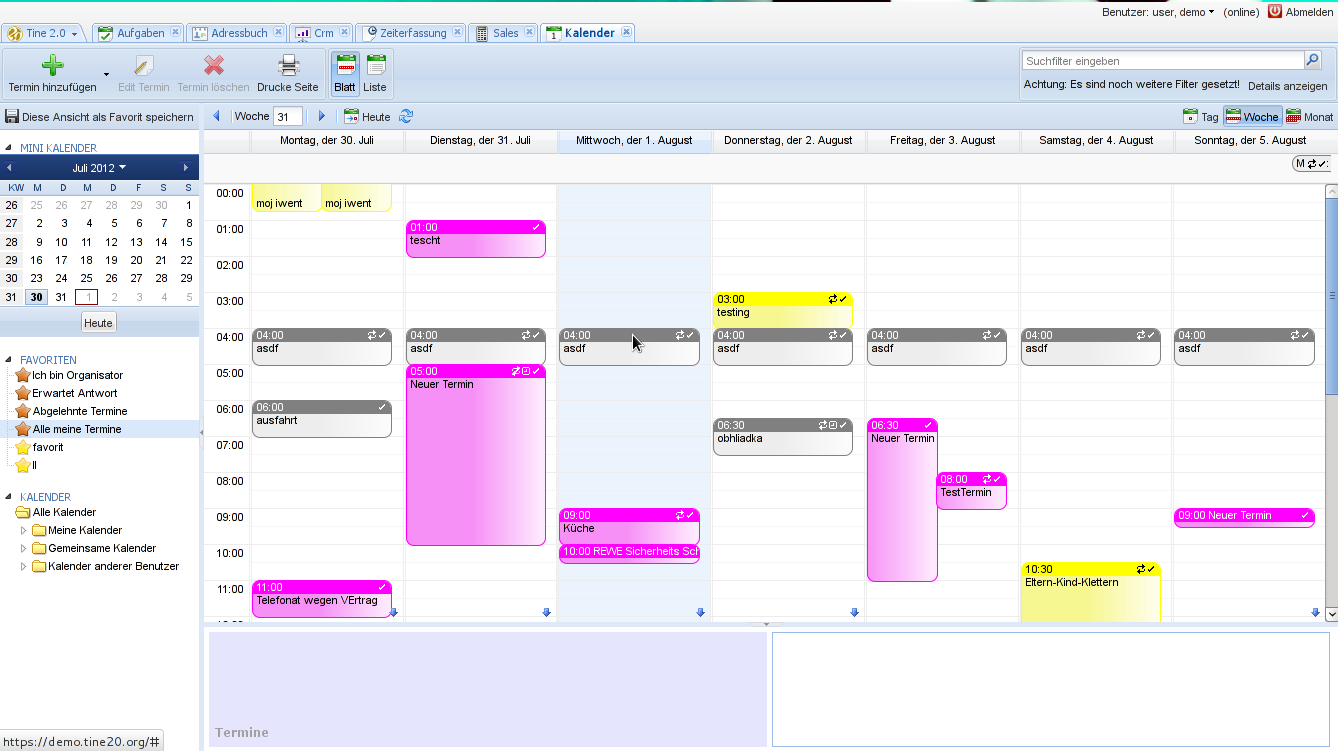|
ERoom
eRoom is an on-line project collaboration, or collaborative software product from Opentext Corporation. Originally developed by eRoom Technology Inc., of Cambridge, Massachusetts, product features include e-mail management, calendaring, instant messaging, project plans, databases, and document management. The company, first called Instinctive Technology, was founded in 1996 by a group predominantly from Lotus Development Corporation (which had been acquired by IBM Corporation in 1995), and was led by CEO Jeffrey Beir. One of eRoom's first clients was Hewlett-Packard, which became one of the first clients to use eRoom's hosted service, in which the eRoom software was run on its own servers rather than the customers' servers, for a monthly fee. In December, 2002, (announced in October) Documentum acquired eRoom Technology in a cash-and-stock transaction valued at more than $100 million. After Documentum bought eRoom Technology, Inc., they began integrating the eRoom produc ... [...More Info...] [...Related Items...] OR: [Wikipedia] [Google] [Baidu] |
List Of Collaborative Software
This list is divided into proprietary or free software, and open source software, with several comparison tables of different product and vendor characteristics. It also includes a section of project collaboration software, which is a standard feature in collaboration platforms. Collaborative software Comparison of notable software Systems listed on a light purple background are no longer in active development. General Information Comparison of unified communications features Comparison of collaborative software features Comparison of targets Open source software The following are open source applications for collaboration: Standard client–server software * Access Grid, for audio and video-based collaboration *Axigen *Citadel/UX, with support for native groupware clients (Kontact, Novell Evolution, Microsoft Outlook) and web interface * Cyn.in * EGroupware, with support for native groupware clients (Kontact, Novell Evolution, Microsoft Outlook) and web inter ... [...More Info...] [...Related Items...] OR: [Wikipedia] [Google] [Baidu] |
Documentum
Documentum is an enterprise content management platform, now owned by OpenText, as well as the name of the software company that originally developed the technology. EMC acquired Documentum for $1.7 billion in December, 2003. The Documentum platform was part of EMC's Enterprise Content Division (ECD) business unit, one of EMC's four operating divisions. On January 23, 2017, OpenText, a Canadian technology firm based in Waterloo, Ontario, Canada that specializes in enterprise content management, acquired Documentum from Dell EMC for $1.62 billion USD. History Getting started Howard Shao and John Newton founded Documentum in June 1990. They had worked together at Ingres, one of the leading relational database vendors at the time, and sought to solve unstructured information management problems using relational database technologies. (Unstructured information refers to information that does not have a formal data structure – documents, images, audio, video, etc.) With init ... [...More Info...] [...Related Items...] OR: [Wikipedia] [Google] [Baidu] |
Lotus Development Corporation
Lotus Software (called Lotus Development Corporation before its acquisition by IBM) was an American software company based in Massachusetts; it was "offloaded" to India's HCL Technologies in 2018. Lotus is most commonly known for the Lotus 1-2-3 spreadsheet application, the first feature-heavy, user-friendly, reliable and WYSIWYG-enabled product to become widely available in the early days of the IBM PC, when there was no graphical user interface. Much later, in conjunction with Ray Ozzie's Iris Associates, Lotus also released a groupware and email system, Lotus Notes. IBM purchased the company in 1995 for US$3.5 billion, primarily to acquire Lotus Notes and to establish a presence in the increasingly important client–server computing segment, which was rapidly making host-based products such as IBM's OfficeVision obsolete. On December 6, 2018, IBM announced the sale of Lotus Software/Domino to HCL for $1.8 billion. History Lotus was founded in 1982 by partners Mitch ... [...More Info...] [...Related Items...] OR: [Wikipedia] [Google] [Baidu] |
Dell EMC
Dell EMC (EMC Corporation until 2016) is an American multinational corporation headquartered in Hopkinton, Massachusetts and Round Rock, Texas, United States. Dell EMC sells data storage, information security, virtualization, analytics, cloud computing and other products and services that enable organizations to store, manage, protect, and analyze data. Dell EMC's target markets include large companies and small- and medium-sized businesses across various vertical markets. The company's stock (as EMC Corporation) was added to the New York Stock Exchange on April 6, 1986, and was also listed on the S&P 500 index. EMC was acquired by Dell in 2016; at that time, Forbes noted EMC's "focus on developing and selling data storage and data management hardware and software and convincing its customers to buy its products independent of their other IT buying decisions" based on "best-of-breed." It was later renamed to Dell EMC. Dell uses the EMC name with some of its products. Prior to ... [...More Info...] [...Related Items...] OR: [Wikipedia] [Google] [Baidu] |
Dell Inc
Dell is an American based technology company. It develops, sells, repairs, and supports computers and related products and services. Dell is owned by its parent company, Dell Technologies. Dell sells personal computers (PCs), servers, data storage devices, network switches, software, computer peripherals, HDTVs, cameras, printers, and electronics built by other manufacturers. The company is known for how it manages its supply chain and electronic commerce. This includes Dell selling directly to customers and delivering PCs that the customer wants. Dell was a pure hardware vendor until 2009 when it acquired Perot Systems. Dell then entered the market for IT services. The company has expanded storage and networking systems. It is now expanding from offering computers only to delivering a range of technology for enterprise customers. Dell is a publicly-traded company (), as well as a component of the NASDAQ-100 and S&P 500. It is the 3rd largest personal computer vendor ... [...More Info...] [...Related Items...] OR: [Wikipedia] [Google] [Baidu] |
EMC Corporation
Dell EMC (EMC Corporation until 2016) is an American multinational corporation headquartered in Hopkinton, Massachusetts and Round Rock, Texas, United States. Dell EMC sells data storage, information security, virtualization, analytics, cloud computing and other products and services that enable organizations to store, manage, protect, and analyze data. Dell EMC's target markets include large companies and small- and medium-sized businesses across various vertical markets. The company's stock (as EMC Corporation) was added to the New York Stock Exchange on April 6, 1986, and was also listed on the S&P 500 index. EMC was acquired by Dell in 2016; at that time, Forbes noted EMC's "focus on developing and selling data storage and data management hardware and software and convincing its customers to buy its products independent of their other IT buying decisions" based on "best-of-breed." It was later renamed to Dell EMC. Dell uses the EMC name with some of its products. Prior to ... [...More Info...] [...Related Items...] OR: [Wikipedia] [Google] [Baidu] |
Hewlett-Packard
The Hewlett-Packard Company, commonly shortened to Hewlett-Packard ( ) or HP, was an American multinational information technology company headquartered in Palo Alto, California. HP developed and provided a wide variety of hardware components, as well as software and related services to consumers, small and medium-sized businesses ( SMBs), and large enterprises, including customers in the government, health, and education sectors. The company was founded in a one-car garage in Palo Alto by Bill Hewlett and David Packard in 1939, and initially produced a line of electronic test and measurement equipment. The HP Garage at 367 Addison Avenue is now designated an official California Historical Landmark, and is marked with a plaque calling it the "Birthplace of 'Silicon Valley'". The company won its first big contract in 1938 to provide test and measurement instruments for Walt Disney's production of the animated film ''Fantasia'', which allowed Hewlett and Packard to formally esta ... [...More Info...] [...Related Items...] OR: [Wikipedia] [Google] [Baidu] |
Collaborative Software
Collaborative software or groupware is application software designed to help people working on a common task to attain their goals. One of the earliest definitions of groupware is "intentional group processes plus software to support them". As regards available interaction, collaborative software may be divided into: real-time collaborative editing platforms that allow multiple users to engage in live, simultaneous and reversible editing of a single file (usually a document), and version control (also known as revision control and source control) platforms, which allow separate users to make parallel edits to a file, while preserving every saved edit by every user as multiple files (that are variants of the original file). Collaborative software is a broad concept that overlaps considerably with computer-supported cooperative work (CSCW). According to Carstensen and Schmidt (1999) groupware is part of CSCW. The authors claim that CSCW, and thereby groupware, addresses "how colla ... [...More Info...] [...Related Items...] OR: [Wikipedia] [Google] [Baidu] |
Proprietary Software
Proprietary software is software that is deemed within the free and open-source software to be non-free because its creator, publisher, or other rightsholder or rightsholder partner exercises a legal monopoly afforded by modern copyright and intellectual property law to exclude the recipient from freely sharing the software or modifying it, and—in some cases, as is the case with some patent-encumbered and EULA-bound software—from making use of the software on their own, thereby restricting his or her freedoms. It is often contrasted with open-source or free software. For this reason, it is also known as non-free software or closed-source software. Types Origin Until the late 1960s computers—large and expensive mainframe computers, machines in specially air-conditioned computer rooms—were usually leased to customers rather than sold. Service and all software available were usually supplied by manufacturers without separate charge until 1969. Computer vendors ... [...More Info...] [...Related Items...] OR: [Wikipedia] [Google] [Baidu] |
Instant Messaging
Instant messaging (IM) technology is a type of online chat allowing real-time text transmission over the Internet or another computer network. Messages are typically transmitted between two or more parties, when each user inputs text and triggers a transmission to the recipient(s), who are all connected on a common network. It differs from email in that conversations over instant messaging happen in real-time (hence "instant"). Most modern IM application (computing), applications (sometimes called "social messengers", "messaging apps" or "chat apps") use push technology and also add other features such as emojis (or graphical smileys), file transfer, chatbots, voice over IP, or Videotelephony, video chat capabilities. Instant messaging systems tend to facilitate connections between specified known users (often using a contact list also known as a "buddy list" or "friend list"), and can be standalone applications or integrated into e.g. a wider social media platform, or a website ... [...More Info...] [...Related Items...] OR: [Wikipedia] [Google] [Baidu] |
Electronic Calendar
A digital calendar is a collaborative or personal time management software with a calendar that can be used to keep track of planned events. The calendar can also contain an appointment book, address book or contact list. Common features of digital calendars are that users can: * Enter their own events * Change the visibility (whether events, groups of events or entire calendars are private, shared with selected users/user groups, or are public) * Subscribe to other calendars * Set up meetings that can be shared or where others can be invited * Different options for setting up reminders There are several varieties of digital calendars. Some have the ability to be connected or synchronized with other calendars across different vendors. The iCalendar 1.0 and 2.0 specifications and its associated standards have been a cornerstone of the standardization and interoperability of calendar software across different vendors. A digital calendar can be viewed as an extension of many of th ... [...More Info...] [...Related Items...] OR: [Wikipedia] [Google] [Baidu] |
.jpg)
.jpg)

